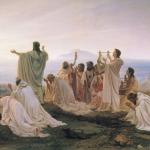I recently finished reading Markus Bockmuehl’s Seeing the Word – a book that wishes to ‘refocus’ New Testament study. He surveys the state of the field and finds it bewilderingly fragmented, compartmentalised, methodologically lost, and unclear about what it (the discipline) wishes to study and what it might accomplish. He suggests that some new directions (such as canonical criticism) are illuminating, but not a centripedal force in the discipline. He suggests two things: first, that we pay more attention to the reception history of the NT – especially to the period up to 150 AD. Secondly, he encourages the guild to have a more direct interest in the implied readers of the texts. These are his major points, but he also frequently makes note of the unity of the NT canon and how, in his opinion, it begs one to read it as a unified whole – even if the unification is sometimes elusive and very general. His personification of the NT canon is at times a bit off-putting as if the guild will agree that the NT is a hoping and wishing entity. Nevertheless, whenever a group is looking at a dismal future (as some may foresee NT studies), a prophetic message such as Bockmuehl’s will be welcomed by many.
Bockmuehl hopes, I suppose, for a coming together of scholars who can approach the text with more of a hermeneutic of trust (he does not use this terminology, but I think this is along the same lines). I appreciate his desire, but I find it unrealistic. There are some scholars who wish to engage in the academy for the end purpose of seeing the Word better and growing the church in maturity. For these kinds of people (of whom I include myself) I say “amen” to Bockmuehl. But, there are many scholars who probably once felt very excited about how ‘theology’ informs ‘faith’, but that flame is gone and they remain in the field because they find the text still interesting (but not the ‘Word’). For this latter group, I presume they are not interested in consensus or a common cause in the pursuit of better understanding the NT texts.
I fear that Bockmuehl will mostly find cheers among evangelicals and conservative catholics (and a few ‘tweeners). Perhaps I can be optimistic knowing that he is part of a new circle (who promote “theological interpretation”, whatever that means) such as Richard Hays, Walter Moberly, Francis Watson, Beverly Gaventa, Steven Fowl, and Joel Green who are respected in both Evangelicalism (maybe not Watson) and in the wider academy.
If you have not picked up this book – I suggest you at least borrow a copy. Let me warn you – you will be ashamed of both how you do NT studies and what your methodological tells are. Bockmuehl everywhere exposes the pathetic shortcuts scholars take in their research. Be prepared for an academic audit. Also, it is not an easy read. He very casually spouts out idioms and references to scholars, books, movements, groups and methods that I have never heard of. It seems his book, in one sense, is a closed conversation for those that know the history of interpretation of the NT quite well and a broad range of hermeneutical approaches and terms. I turned to the internet for more information and ‘background’ on a number of occasions. Yet, Bockmuehl is one of the most elegant (perhaps even magisterial) NT authors I know. He is a model to scholars in NT. His knowledge of scholarship past (both near past and far past) and present is outstanding and unmatched even by scholars decades older than him. This book seems like something read aloud at SNTS to a response of thunderous applause and also some ‘humpfs’ and sneers. All in all, it is not easy reading, but a book I think that will continue to resurface in the guild as conversations continue about where we are going in the discipline.











